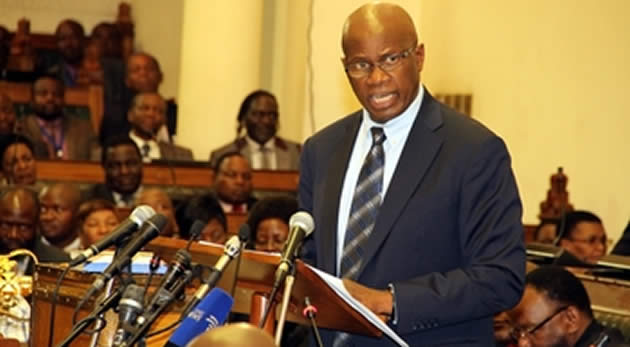Bringing sanity to the economy. . . finance minister Patrick Chinamasa’s statement to the media

UNDER the direction of His Excellency the President, Cde RG Mugabe, Government has since November 26, 2013, been seized with the task of uprooting rampant corrupt practices with respect to excessively high and unjustified salaries and allowances that most State Enterprises, Parastatals, and Local Authorities have been either illegally, unprocedurally, unreasonably or immorally awarding to the Chief Executive Officers and other executive managers.
Accordingly and with immediate effect Cabinet has decided, as an interim measure, that no Chief Executive Officer of any State Enterprise, Parastatal or Local Authority should receive a Total Pay Package (basic salary plus benefits) which is above $6 000 (six thousand dollars) per month for those in job level 1.
Accordingly therefore salaries should be immediately cascaded downwards in each organisation. However, the lowest paid employee should not fall below the poverty datum line.
Government has taken this drastic measure in order to assure the public that it is committed to dealing with the widespread cases of abuse of remuneration processes in the public sector, pending finalisation of the appropriate remuneration structures.
Tables 1, 2, 3 and 4 in Annexure I give various scenarios that will apply in determining the interim salaries for CEOs of State Enterprises and Parastatals in line with Cabinet decision.
In the same vein, Cabinet has resolved that investigation be carried out to ascertain the extent of Board fees and other emoluments paid to Chairpersons and members of the Boards of State Enterprises and Parastatals and members of Local Authorities (Councillors) so that on the basis of information received corrective action can be taken.
At its sixth meeting on March 4, 2014 Cabinet approved a set of measures to bring sanity with regards to the corporate governance of Parastatals, State Enterprises, Parastatals and Local Authorities.
These measures which are now in force, were announced through a Ministerial Statement that I gave in the National Assembly on Tuesday 4th March, 2014.
As is now self-evident from information readily available in the public domain through persistent and widespread media reports, the source of the malaise afflicting Parastatals, State enterprises and Local authorities is the unjustifiably high salaries and allowances paid to senior managers of these entities.
In the public eye, these exorbitant salaries and allowances are not only corrupt but also obscene.
The public’s outrage is justified. After a systematic and thorough examination of the malaise in Parastatals, State enterprises and Local authorities over the three or so months under the auspices of the Cabinet Committee on State Enterprises and Parastatals Development, Government has established the following about the situation on the ground:
That employment costs in the public sector are a key driver of cost increases in the broader economy;
That the private sector takes a cue from the public sector when setting their own salaries;
That in most cases, State Enterprises, Parastatals, and Local Authorities raise their utility and service charges in order to finance their high salary levels.
That most of the State Enterprises, Parastatals and Local Authorities are saddled with debts accrued from outstanding salaries.
The high levels of employment costs in public entities and local authorities adversely impact on national economic competitiveness, which has resulted in the current situation, where the country operates on a typically high cost but low production economy.
There is therefore urgent need to address this state of affairs to ensure the success of the Zim Asset.
Furthermore, there is need to unlock the potential of public enterprises as catalysts for the country’s overall socio-economic development.
It is notable that in the past State Enterprises and Parastatals used to have a combined contribution of 42 percent to GDP.
Furthermore, Government has established that:
The remuneration of State Enterprises and Parastatals (SEPs) CEOs and Heads of Local Authorities are excessively high and not consistent with the general performance of the economy, the organisations’ capacity to pay, the incumbents’ performance and specific level of responsibility (job sizes);
There is no uniformity in the application of the basic pay to benefits ratio for the entities;
CEOs of Parastatals, State Enterprises and Heads of Local Authorities have overwhelmingly switched towards higher benefits relative to basic salaries, which could suggest prevalence of scheming and other tax evasion practices.;
Some CEOs exploited their organisation’s capacity to pay to award themselves hefty packages at the expense of the national economy; and
Some CEOs are awarding themselves hefty packages out of statutory revenue collections, which were not a result of their performance.
In light of the foregoing, Government has approved the following as principles that should guide the remuneration policy of public enterprises:
i. That as a principle, the remuneration for CEOs of State Enterprises and Heads of Local Authorities should be based on the following:
the performance of the economy;
the organisation’s capacity to pay;
the overall performance of the incumbent;
the need to recognise specialist skills;
the level of responsibility (that is, job size as determined by Accountability, Problem Solving demands and Know-How); and
the need to comply with the requirement that the entity’s total employment costs should constitute at most 30 percent of the budgeted expenditure while 70 percent goes towards service delivery.
ii. That the 13th cheque be based on performance and not given as an automatic entitlement.
iii. That the Total Pay Package be split into basic pay and benefits at a ratio of 60 percent/40 percent, respectively.
iv. That any remuneration outside the framework is not permissible, and any pecuniary prejudice to the company in this regard be recoverable from the incumbent;
v. That the benefits portion of the Total Pay Package (40 percent) be applied on a cafeteria basis, reflecting the need for flexibility to the changing nature of employee benefits in the employee’s tenure with the employer.
Listed below is the gamut of the possible benefit items to be considered under the cafeteria system:
Utilities (i.e. Water and Electricity);
Fuel allocation
Company vehicle
School fees
Housing Allowance
Medical Aid
Telephone/Cellphone Allowance
Holiday Allowance
Club and Professional Fees
Entertainment Allowance
Retention Allowance
Group Life Cover
Travel Allowances/Air ticketing
vi. That specific components of the benefits portion be determined by the respective Boards, having regard to the nature of the particular organisation, and in the case of Local Authorities, by the Local Government Board;
vii. That the tax laws be applied on the Total Pay Package (that is, Basic Pay plus Benefits);
viii. That the CEO’s employment contract should clearly spell out, at the point of engagement, the terminal benefits due to the CEO, and the grounds for the forfeiture of such benefits arising from the circumstances under which one may disengage from his/her employment contract;
ix. That the labour laws be reviewed to remove the constraints that relate to the following:
retrenchment
terminal benefits
procedures for dismissal
downsizing
working hours
arbitration awards system
x. That the Local Government Board be mandated to approve conditions of service for Local Authorities;
xi. That consideration be given to categorising local authorities for purposes of determining their conditions of service.
It may therefore be instructive to categorise these entities as follows:-
Local Authorities
a) Category I:Metropolitan cities
b) Category II: The rest of the cities
c) Category III: Municipalities
d) Category IV: Town Councils, Boards and Rural District Councils
Government notes that soon after Independence, the salaries for Town Clerks and CEOs in the various categories of Local Authorities were equated to certain senior Civil Service grades. Heads of Local Authorities’ Salaries will be equated to the following civil service grades:
a) Category I: Permanent Secretary Grade
b) Category II: Principal Director Grade
c) Category III: Director Grade
d) Category IV: Deputy Director Grade.
State Enterprises and Parastatals
xii. It has been decided that the Hay Job Evaluation System be adopted with regard to State Enterprises and Parastatals.
The Hay methodology evaluates jobs against a set of common factors that measure Know-How, Problem Solving, and Accountability.
The jobs are placed in levels ranging from 1 to 6.
Those in level 1 are expected to be more demanding in terms of the factors outlined above, and hence should be paid commensurate to the appropriate level.
Xiii. Cabinet has directed that the Cabinet Committee on State Enterprises and Parastatals Development to remain seized with the matter and should, on the basis of audit findings, come with concrete recommendations on remuneration structures for Chief Executives of State Enterprises and Parastatals and Heads of Local Authorities.
Hon. Patrick A Chinamasa, MP is Minister of Finance and Chairman of the Cabinet Committee on State Enterprises and Parastatals Development. This was the press statement he released to the media as he announced a cap on salaries and benefits of CEOs of state enterprises and parastatals.








Comments